From why spicy isn't a taste, to how long it takes a comet to form, we've gone in search of the answers to the questions you've been sending in. We investigate whether the Internet is immune to a breakdown, if a person dreams under anaesthetic, why days are divided into 24 hours, and could an explosive stop a storm? Plus, news of a new cancer therapy that's got everyone talking, and how to recycle wasted energy...
In this episode

Why do unconscious people feel heavier?
Kat asked Ginny Smith this weighty question...
Ginny - If you think about it in terms... has anyone ever seen a dancer being lifted in the ballet or perhaps a gymnast or an acrobat? Now it might not look like the person being lifted is actually doing very much. It looks like the person doing the lifting is doing all the work but actually, that dancer or that gymnast is doing a lot. They're using their core muscles to help hold themselves up and I think that's probably what your daughter does when she's awake. She'll be sort of holding her muscles in a way that makes it easy to pick her up. She might even sort of wrap her hands around your neck and hold on and that helps spread her weight so that you're carrying her with you arms, but some of her weight is actually going down through your shoulder and your back which is stronger than your arms so she doesn't feel as heavy. Now when we go to sleep, we basically lose all of the control of our muscles. We become paralysed, we become completely relaxed and floppy and you may have noticed if you pick up someone when they're asleep, they can be a bit like a rag doll sort of flopping all over the place. So her muscles won't be engaging in order to help with the lifting and, actually, what you're doing, you're feeling her full weight. It's not any more than she weighs, she hasn't actually put on any weight but you're feeling every pound of that weight because she's not helping.
Chris - Not called a dead weight for nothing then?
Ginny - Exactly, exactly.
Kat - So this is the same principle, when someone is dead they weigh their actual weight but they're just more difficult to lift.
Ginny - Yes and we're just not used to lifting people who aren't helping with the lifting because normally, when you lift someone who's awake, they automatically contract their muscles and do everything they can to make themselves as easy to lift as possible.
Kat - I used to have a Basset Hound dog and she was just impossible to pick up because she'd just sort of go all rubbery and become floppy and really, really difficult to lift.
Ginny - Sometimes toddlers do that as well if they don't want to be picked up. They'll make themselves really difficult; they'll go completely rigid or you know that kind of thing if they're having a tantrum but, most of the time, people try and help

03:52 - Could the Internet fail?
Could the Internet fail?
Kat asked Peter Cowley if the internet could actually die in the first place...
Peter - Yes, I think we'd probably live without the internet in time but let's just unpack the question. Presumably the questioner means, will the internet die completely but the internet does actually die in short burst anyway. The BBC had what they call a "distributor denial of service attack" at the end of last year. So the BBC site was down - only for a day. It was hardly dying but it was obviously very ill that date. Country's censor: China censors quite a lot of sites. In the Arab Spring, social media was switched off in a number of countries in the Middle East, so those are ones that are short term. Ones that are sort of not death but when it's ill is things like broken cables. Broken submarine cables - that happens remarkably often - trawlers and things.
Kat - So there's a difference between the sort of the technical hardware breaking down and then the servers where the internet pages live not being allowed to get through to us?
Peter - Get through. exactly, yes that's right exactly. So there are times in these situations where it would slow down but what the question is actually asking would it, could it ever die? Now I think there's only about three different reasons that could happen. One is some sort of global war; with a threat like that where the whole of the population of the Earth would be badly affected by that, purely because of what was going on in the war. It could be somebody ruling the planet would switch it off. Or it could be some really massive cosmic or gamma shower. Kat - So something like a solar storm. That's something we hear worries about that that could knock out communication systems.
Peter - But more than that - it would knock out probably most electronics. So you know a lot of aircraft would fall out of the sky, telecommunications and everything.
Kat - And no-one could tweet about it because the internet would be broken.
Peter - Exactly. So everything would shut down: banking, transport, utilities, power, water, all kinds of thing. But, of course, once you remember that it's only been about 15 years that the internet's been in mass use even though it's been around probably about 50 years. So we could recover from that reasonably quickly, I suspect.

Why do we get more nose hair as we get older?
Kat put this question to Chris Smith
Chris: - It isn't just confined to me. Everybody gets more hairy as they get older and the reason for this is that the hair that you have on your body is actually sensitive to androgens (these are testosterone-like chemicals) and, as you go through life, your testosterone exposure of your hair follicles that grow hair increases and so, therefore, you are destined to become hairier as you get older because testosterone encourages those hair follicles to grow more hair. Kat - And is this both men and women as well?
Chris - Yes it is, and specifically what testosterone or testosterone-like chemicals do is prolong what's called the anagen phase of hair. Hair goes through three phases: it has an anagen phase when the hair grows; it has a catagen phase when the hairs stops growing - the hair follicle switches off, the hair falls out; and then it goes into a telogen phase which is it's resting phase for a little while and then it starts growing again back to the start. The testosterone-like signals prolong the anagen phase, and the anagen phase dictates how long the hair's got to grow for, so therefore, you're going to get a longer hair if you make the anagen phase longer. So you will have the same number of hairs on your body but you will make thicker, bigger, longer hairs in response to testosterone. To come back to your question about women. Women are vulnerable to this but they tend to be less vulnerable until the age of the menopause because at the age of the menopause, the level of oestrogen in the bloodstream falls down and oestrogen reverses the effect on the hair follicle of testosterone - it stops the hair follicle responding to testosterone. So when the oestrogen level comes down a bit, the testosterone becomes - and women do have testosterone - it becomes more dominant and, as a result, you do see more hairs growing. Nose, ears, other parts of your body as well.
Kat - And what should you do about it? You know can you just pluck them out?
Chris - Very, very painful. I don't know if you've tried plucking nasal hair but some people say this is the strongest stimulus that you can succumb too.
Kat - Guys round the table - is there nose plucking here guys? No!
Chris - It makes you cry really, really profoundly but yes, you can trim them. It's a myth that if you trim hair it will grow back more. No evidence for that whatsoever! So you can comfortably clip and away and snip away at your nose and ear hair and you will do it with impunity - you'll be fine.
Kat - Ginny...
Ginny - Why does this only apply to nose hair and ear hair and basically and hair where you don't want it? Why does the hair on your head, particularly for men, get thinner with age then?
Chris - It does with women as well. And there is a conversion process of turning the testosterone in the bloodstream - or in women, testosterone-like chemicals - get converted into dihydrotestosterone in the scalp and, for some reason, certain populations of the hair follicles on the scalp are sensitive and they die in response to the build-up of testosterone there or the exposure to testosterone. The receptor that does this is on the X chromosome; men have only one X chromosome, but women have two. So if you have the variant of the gene that makes you susceptible to balding and you're a man, you have that and nothing else so you're destined to lose your hair in that male pattern. With women, because you have two chances - because there are two X chromosomes, and you randomly use one or the other all over your body - then you've actually got more chance that you won't see a loss of hair, and, also, the testosterone is lower to start with in a woman.

Could we terraform Venus?
Kat put this question to Stuart Higgins...
Stuart - It's a really interesting question. Maybe I should set out to start off with that terraforming is this hypothetical idea that we could go to another planet and somehow do a very large scale engineering project that would change the environment into a living habitable environment a bit like the Earth. So people often think of going to Mars and trying to give it an atmosphere and this is a good question, why not Venus? It's a planet that is a very similar size to Earth, it has 90% of the gravity so it would be similar in that respect. But actually it's almost highlighted in the question, it's a real problem in terms of the energy required. Venus is a very chaotic environment it's got an atmosphere made of 95% carbon dioxide, it's incredibly high density so on the surface of Venus the pressure of the atmosphere pulling down on you is 92 times the pressure on Earth.
Chris - That's just because there's so much gas in the atmosphere weighing down on you on the surface is it?
Stuart - There is there's just so much carbon dioxide in the atmosphere and as a comparison that's like standing 900 metres under the surface of the sea so there's huge pressure you'd get crushed.
Kat - You'd get squished basically.
Stuart - Also the temperature on the surface, it's about 450 degrees celsius. It's hotter than your oven on the surface.
Kat - So you're effectively a pancake?
Stuart - Yeah, you're a pancake on the surface there.
Chris - How did all that gas get in the atmosphere in the first place? Why's the Earth not like that?
Stuart - That's a really interesting question. So there are arguments around whether different planets, say Mars or Venus, were more like the earth in times gone by. One of the issues actually, or one of the big difference between Venus, Mars and the Earth is that the Earth has a magnetic field. And that's because we have convection currents of materials in the earth's core that create this magnetic field and that protects us from something called the solar wind and the solar wind is basically a lot of highly energised particles flying off the sun and striking the atmosphere of the Earth and the magnetic field in our case protects us from that. In the cases of Venus and Mars that's not there to protect it so, even when you do get things such as oxygen forming those molecules can be bashed into by the solar winds and taken off into space so they wouldn't even collect them to start off with.
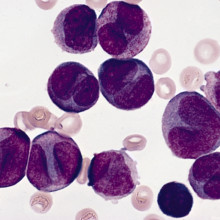
12:29 - Ground breaking cancer treament
Ground breaking cancer treament
with Dr Kat Arney, Cancer Research UK
Initial results have been announced about a new form of cancer therapy for leukaemia. The statistics are impressive, but how excited should we be? We asked our resident cancer research specialist Kat Arney to explain...
Kat - For my day job I work for Cancer Research UK and we've had an incredibly busy week this week because there were lots of headlines saying cancer cure, treatment, all of this. And it came from a presentation that was made at a meeting where researchers who'd been running a small clinical trial of a new type of therapy that's called "immunotherapy" where researchers use cells from a patient's own immune system that they take out of the patient.
They basically genetically engineer them in such a way that they can recognise and destroy cancer cells and then they put them back into the patient's body where the seek out, recognise, and destroy cancer cells. Now it's a very small study that was done - there were about 35 patients in it and for types of cancer called leukaemia and lymphoma.
These are cancers that affect cells in the blood system and that's quite an important point. And they had, in some cases, some quite remarkable sounding, effectively cures, people seemed to get completely better. And these were people with terminal cancer and they'd had all the treatment options they possible could and their cancer was still growing.
That said - it's a small study. It was also presented at a meeting; we haven't got the full set of data; it hasn't been reviewed and published in a scientific journal. And it's really important to point out that there were at least seven people who had very severe side effects from this treatment. There's something called a cytokine storm, where their immune system gets massively over-stimulated; it produces all these really unpleasant molecules and, in fact, two people died as a result of this huge immune over-stimulation.
So while the treatment can work for some people, it didn't work for all of them and there are side effects. So there's a lot of work to be done to kind of unpick this and, also, it was for these particular types of blood cancer because they have a molecule on the surface of the cancer cells that relatively - relatively - easy to train the immune cells to seek out and destroy. Other cancers, types of cancer, particularly the listener who's written in here about her son who has a type of cancer called retinoblastoma which is a type of cancer that affects the eye in children.
Those cancers are going to be more difficult to target because you have to work out what are the molecules on the surface of that particular cancer. How do we train the immune system to target those? How do we get these immune cells there into the tumour in enough level that they can actually do their duty. So it's a huge ongoing research project around the world.
There's lots and lots of labs working on this; lots of trials underway. And it is really exciting and certainly I've worked at Cancer Research UK for 11 years now and it is very exciting stuff but it's not the cure for cancer right now.

Would immunotherapy work for other cancers?
Dr Chris Smith answered Jess' question... Chris - Retinoblastoma is a tumour in the back of the eye. It is caused by inheriting a faulty copy of a gene that stops cells dividing when something goes wrong and this means that there is a high likelihood that an individual who has this change to their DNA will develop a cancer, not just in one eye, but in both eyes and at a very young age. Now the problem with using this same treatment that we've heard about from the blood cancer on retinoblastoma, ask Kat says, you need to find a marker which would single out the cancer cells from healthy tissue. Now, actually, with the present treatment that Kat's been talking about, they didn't do that. What they used is a marker that's present all kinds of immune cells called B-lymphocytes in the body, a subset of which in these patients were the cancerous ones so, actually, they did destroy some healthy cells, some B-lymphocytes in order to get rid of the cancerous B-lymphocytes and these people now no longer have B-cells; they can't make any of their own antibodies, they're going to be dependent on blood transfusions. But there is currently no marker that we know of that we could use specifically for these retinal cells that might be cancerous which would prevent the immune system from damaging a healthy retinal cell as well, and we don't want to send someone blind unnecessarily. So, at this stage, it needs a lot more work as you say.
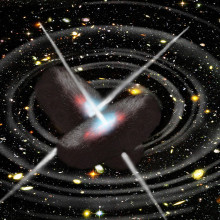
Where did gravitational waves come from?
Chris put his question to physicist Stuart Higgins... Stuart - It's a mixture of two things. So in order to interpret the data from this particular experiment, the LIGO experiment, they've been simulating the kind of behaviours they might expect to see for a very long time. They've been running all of Einstein's equations through models trying to understand. So that's how they pattern match, that's when they know when a fingerprint comes along what they're looking at and, in this case, that represented two black holes. But, in that case, where can they get extra information about where it comes from. Well, in part, that's got to do with the fact that they've got two detectors in two different locations. And it's a combination of the fact that they've got two detectors, which helps them verify they're seeing something that's definitely happening, combined with those calculations that lets them see.
Chris - And do they then look out into space in the right sort of the direction that the detector is looking in and look for a phenomenon, i.e. a big black hole out there now and say well look, that probably was two smaller black holes a billion light years ago, a billion years ago and they've merged and that was the source of the wave. Can't find anything else in that neck of the woods in space to account for it?
Stuart - In this particular case, it was just one event they were looking at. Now I don't know if they're looking in that particular area. I think what's really exciting is that although this is an initial result, it's given, it's shown that this particular type of telescope which is effectively what it is. It's a way of doing astronomy, a way of looking at the world. It's actually now going to be possible to develop that tool into a way we could do what you're saying, which is to look deeper into certain areas and scan certain areas and regions of space.
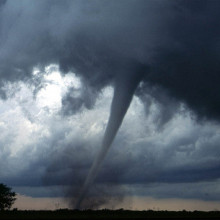
Could we dissipate a tornado with a rocket?
Stuart Higgins took a shot at answering Jheanne's question ... Stuart - I love this idea that, you know, you could put a little firework into it and it would suddenly fizzle out and the tornado would disappear...
Chris - I think he's actually saying put a nuke into it, actually, isn't he? I mean let's not do things by halves.
Kat - That's an extreme solution. So would it work if you put a massive source of energy into a huge energetic tornado - would it work?
Stuart - Well it's a really difficult question, and the reason why it's difficult is because we still don't understand properly the complex behaviour of how tornados form and what's really going on. And one of the big problems is also, that if you try and put your scientific instrument in the way of a tornado to measure what's happening inside - it doesn't last very long.
Kat - Oh yes.
Stuart - It kind of gets blown away by the wind.
Chris - But what do people think when they do theory - people have run models and things. What do they think powers a tornado? How do they think it works?
Stuart - So, at a kind of basic level there's an idea that it requires a mixture of two different environments. It needs moist, warm air meeting cool air and that will give the ingredients for a thunderstorm, and tornadoes usually form from a particular type of thunderstorm called a supercell. And the argument generally is that if you have say a surface wind blowing in one direction and winds at a higher level blowing in another direction, you get this rotating funnel forming and that if you have an updraft you might turn what is a horizontal funnel into a vertical one where it touches down and becomes a tornado, so that's kind of the theory. It's still very complicated - it's still not very well known. I wanted to do some calculations, I really wanted to try and work out some numbers but it's not really meaningful without a better understanding of what it is. But this idea has come up a few times and I'm going to refer to the National Severe Storms Laboratory in the U.S., which is a government laboratory who study these kind of phenomena, and they mentioned that if you could get enough energy to dissipate the tornado, well that might work but, actually, the tornado is a fraction of the energy of the total storm. So you might just end up with another tornado forming straight away anyway from the same storm.
Chris - Ah, so you might paradoxically detonate your explosion and trigger another one?
Stuart - Well yes. Get rid of one and another comes straight back at you.
Kat - Yes, so it's like 'Whack-a-mole' with tornadoes, basically.

How does chronic stress affect the body?
Ginny Smith kept it cool when answering Anthony's question...
Ginny - Well, let's start with the first half of that question. So stress has evolved to protect us but the kinds of things it evolved to protect us against were - oh my goodness, there's an animal there that wants to eat me. They're quite short term problems and our body deals with them by preparing to either fight or to run away. It releases adrenaline, your heart rate speeds up, your breathing quickens - all these sort of things that are going to help you run away. Now in modern day life we don't encounter a lot of scary animals that want to eat us and our stresses have become very different things and that's led to this phenomenon of chronic stress. When your stress is something like a horrible boss who's giving you more and more work every day and is really, really demanding, it's ongoing and you can end up with the levels of the stress hormone which, for short bursts aren't going to do you any harm. If they continue being raised for a long period of time they can do some really nasty things. They can weaken your immune system and they can lead to all sorts of problems, and that's what we call chronic stress.
Kat - And is this similar - I know a few people who have anxiety and things like that where they sometimes say, you know, they feel like they're on the edge all the time. And is that again their sort of adrenaline and their cortisol, the stress hormones just going over time?
Ginny - Yes. So we think anxiety is linked to stress hormones but no-one fully understands it. But anxiety attacks can be really, really horrible things where people almost feel like they're dying and we don't fully understand them but, yes they are linked to these kind of raised levels of these hormones.
Kat - And what about animals? You know, do dogs and cats and birds - do they get stressed out?
Ginny - Well, this is interesting because the kind of stress that we've been talking about is a very human kind of stress. Actually, people use the term stress in relation to animals to mean any kind of physiological challenge. So it could be being cold or being hungry or not having somewhere to hide.
Kat - Put them in a box.
Ginny - Those are stresses. So, if we talk about about stress in that terms then yes, all animals can get stressed if they're cold or they're hungry, they're not happy, they're stressed. If we mean the more kind of human type of stress that we were just talking about, then it very much depends on the level of intelligence of the animal. So we know for definite that chimps can become stressed. Subordinate chimps who are the ones who are not in charge, they're much more likely to show stress related behaviours and have raised levels of these hormones than the dominant chimps. The equivalent of your boss being less stressed than you.
Kat - What about animals in zoos? Because you hear about certain animals or things like the orcas in some sea life parks where they're getting very, very unhappy.
Ginny - Again, I don't know if the studies have been done specifically on them but orcas are very, very intelligent so I wouldn't be surprised if they showed similar effects. They've also shown that pets can pick up on human stress. So I think if we're thinking about these kinds of animals that live in social groups that have quite complex lives, then they can exhibit stress like us. The less complex the animal's life is perhaps the less likely they are to exhibit that kind of stress.

How do we store solar and wind energy?
Kat Arney asked Peter for a solution to this question...
Peter - Yes, well I assume the question means how do you store them, not in it's current form, so the concept of storing photons.
Kat - Yes, the sun: that's a good storage device.
Peter - Of course, there are all different kinds of ways of doing that. There are three main ones which are: chemical - so you charge a battery and discharge a battery - so you're storing the energy from solar or wind and you can use it again at other times, particularly that moves the energy production from say daytime to nightime. Kinetic - so fly wheels. Things where you're changing the energy into somethings that's kinetic which can then be run down again.
Kat - So like winding up a spring effectively and then like "poing".
Peter - Yes, there's some work done here in Cambridge on superconducting high temperature magnets for for flywheels for storing energy in Saudi Arabia, specifically. Or, of course, potential energy and that's been done for many years in North Wales actually. There's a power station called Dinorwig (I hope I've pronounced that correctly), which is about 2 gw, which is done by pumping water up when you've got spare energy capacity in the grid and letting it come back down again and generating power when the need's high because we're getting close to to our peak production.
Kat - And where are the innovations coming from because I know people like Tesla in the States, they're very excited about trying to get better batteries. But it does feel that, although there's been a lot of emphasis on more efficient solar panels and stuff, it doesn't really seem to be a lot of emphasis on making better storage techniques or better batteries.
Peter - Well actually the battery's a different issue altogether. That's to do with the chemistry of the battery and that's not satisfying us. Our mobile phones don't last long enough, etc., or our smart watches which we'll talk about in a few minutes no doubt. It's not that, it's how this energy is being stored. Now, if the amount of energy that can be produced by everything say in the U.K. is limited of course - in any country it is. But if you can move the usage away from the peak times to other times by storing energy, then you don't need to build new power stations. And that's being done either at the edges of the grid with big containers full of batteries or actually being done in the home which is where the Tesla thing comes from. So the Tesla Box which is quite expensive, but there are UK versions of it, where you're actually storing the energy in the home from solar or from cheap energy overnight and then distributing it out, possibly as DC because more and more devices, your USB devices, you LED lighting is DC, so yes, there is lots going on.
Ginny - Are there issues not just with storing the energy but also then connecting everybody up. Because say if we all put solar panels on our house, we wouldn't necessarily only be using the amount of power made from them. So how do you connect up all the different power stations?
Peter - Well that's been done for several years now because you can sell your solar energy back into the grid. So there is something called the feed-in tariff which allows you make money out of the solar panels so actually, with electricity, it's pretty well connected in the U.K. anyway. If you were to connect other things like water - is not nearly as well connected.
Stuart - It's really interesting is the other side of that as well which is the usage. So there's a lot of research into smart grids which is the idea of can you do clever things with all these connected electrical devices. So there's a company in London that's looking at you know, can they shut down the air conditioning in a particular hotel for a few hours that would reduce demand, learn to moderate the flow of energy coming out of the system to try and meet some of those demands and actually do things on the other side, on the consumption side as well.
Chris - Yes, sort of knowing what are priority things. Like you wouldn't want to turn off someone's life support machine, for example, in order to meet the demands of the grid, but my fridge really won't care if it's interrupted for five minutes when everyone's turning their kettle on because their favourite tele programme has gone to adverts. And so you can dynamically shift power around the grid to make it more efficient so we don't have to keep loads of power stations sort of running on standby to mop up the shortfall.
Peter - That is going to be happening. The smart meters and all our devices, in time, so we won't actually have control over when the fridge is or the freezer is on or off. Of course, if we want lights on we're allowed to switch those on.

29:54 - Harvesting waste energy
Harvesting waste energy
with Peter Cowley
Secondary school science lessons taught us that pretty much all processes give off waste energy, in our energy hungry world of washing machines, cars and mobile phones this seems like an untapped resource, but maybe not. Energy harvesting uses technology to gather waste energy and put it into something useful, Peter Cowley explains all to Kat Arney...
waste energy, in our energy hungry world of washing machines, cars and mobile phones this seems like an untapped resource, but maybe not. Energy harvesting uses technology to gather waste energy and put it into something useful, Peter Cowley explains all to Kat Arney...
Peter - It is huge untapped resources as you can imagine and it's been done for many years. I mean winding back a watch, which goes back 6-700 years, you're actually winding it up from energy from your hand, which is to do with food producing energy, which is then stored in a spring. I've actually got two watches on for some strange reason today. I've got one that winds automatically, which is a Swiss one, which is very nice one...
Kat - So when you wiggle your wrist it winds up. So is there a weight in there or something that's wiggling?
Peter - There is something that rotates and the springs built up so, basically, it runs overnight. So when I've taken it off it will work for about 24 hours. On my other wrist I have a smartwatch.
Kat - Do you have to plug in your smartwatch overnight then and charge it?
Peter - You do, unfortunately - it's terrible.
Kay - Tell us some examples of how this spare energy: How can it be generated and how can we trap it and harvest it?
Peter - There's something called smart pavement slabs that's been around for some time, which doesn't generate much power, but does actually show the importance of saving energy.
Kat - So this when people step on the pavement it's generating energy?
Peter - Correct. It only generates a few milliwatt hours, so it won't generate very much unless you've got huge crowds. There is a lot of work going on, as you know, internet things. Lots of devices out there. These sensors need some sort of power; the powers got to come from somewhere, it can't always come from solar power, it can't come from because you have to change those. So actually, collecting energy from vibrations, collecting energy from movement, collecting energy from temperature variations. There's work also that's been mentioned in BBC site quite recently was to with pacemakers have batteries, batteries need changing unless you charge them externally, but there's an awful lot going on in the body with temperature changes and movement so why can't you actually just take the energy from that. And somebody tried it on pig's heart actually - just the movement of the heart will generate five times more than you need on a pacemaker
Kit - Stuart...
Stuart - Yes that's really interesting. There's a whole field of research called thermoelectrics, which is the idea of can you use materials to directly generate a voltage, to directly generate the power. And that's actually something we do at the Physics Department at the University of Cambridge is look into those different materials and try and understand, can we convert that into voltage directly from the heat of around they system.
Kat - Because you can generate voltage can't you just by having two things at different temperatures?
Stuart - Yes, that's the thermoelectric effect. It's just having two things at different temperatures and they will naturally form a voltage in certain materials.

Can you have more than one cold at once?
Kat asked Chris for an answer to this sniffly question...
Chris - Originally, we thought the answer to that question was "no". And the reason we thought the answer to that question was no is that when you are infected with a cold, which is a virus, the virus goes into the cells lining your nose and throat (and possibly your lungs) and it triggers what we call an interferon response. The virus trips over various molecular tripwires inside your cells, triggering the cells to sound an alarm, and that alarm signal spreads to all the other surrounding cells and goes systemically through your body. It puts your other cells into an anti-virus state, making them very hard to infect and very hard, or much harder, for viruses to grow in those cells. So we went around saying, "well, we therefore think it's unlikely that you'll suffer from more than one virus infection at a time."
Now, in the last ten years or so though, certainly in our hospital and almost universally in most first world hospitals, we've switched over to what we call molecular diagnostics. This is where people send in blood samples, or they send in samples of swabs from their nose and throat when they've got various respiratory illnesses, and we extract the DNA or RNA - its chemical relative - from those swabs and then we read the genetic message to see which virus signatures we can pick up. And what we're routinely seeing now is that there are people with three, four, in some cases five different virus infections recoverable at the same time. So, while it's probably true that you will get this very powerful immune response, including the release of this chemical interferon when you have a virus infection, it's also true that you are not put into a completely resistant state and you can succumb to multiple viruses at once. We know what they are, and we also know that they can do what we call "synergise": if you've got two things going on at once, they can make you worse than if you just had one thing badly.
Kat - Oh, because I've had a really horrific stomach bug over the past sort week or so. You know the full like up and down and feeling grotty. I thought, "am I immune to getting something like that again?"
Chris - Well, there are a number of aspects to this. When you have had an infection, then you will develop a neutralising antibody response to the thing you have just succumbed to. And what that means is your immune system has seen what it looks like, it makes antibodies and it makes an immune memory, which includes making more antibodies for the long term but also white blood cells capable of attacking cells that have got that virus in. So, great, you're not going to catch that virus again. But, a lot of these virus use a chemical called RNA as their genetic material instead of DNA. And RNA, unlike DNA which is double stranded - one strand is the genetic mirror image of the other and it's like a backup copy, so if something goes wrong with one strand you've got the backup image to fall back on - RNA is just a single strand of genetic information and if that changes, through a process called mutation, then you change what the virus looks like. It's like a molecular facelift for a virus. And what that means is that you just don't recognise it for what it is and it can come again. This is exactly what the flu does and it can come again, and again, and again. Norovirus, which if you've had a really bad dose of upset stomach, is a good contender, changes probably faster than any other virus that we know of. Roughly 1 in every 100 genetic letters that it makes is going to have a genetic spelling error in them. And the harsh reality of Norovirus is that in every millilitre of what leaves your body - upwards or downwards - when you're infected, there's enough virus in that 1 ml to infect the entire population of the world.
Kat - Well that's a joyful though for us all.
Chris - So it's hard not to catch it!

Why do we have handedness?
Kat put this question to Ginny Smith...
Ginny - Well, the answer to this is we don't fully understand why we have handedness and why around 9 out of 10 of us worldwide are right-handed. From an evolutionary point of view, we know that it's been like this for a very long time because there are some cave paintings from between 10 and 30,000 years ago, where what the people did was they put one hand on the cave wall and they used the other hand to hold a pipe and they blew paint through it and they took their hand away, so they left like an outline of their hand. And if you're right handed, you do that by putting your left hand on the wall and blowing through the pipe in your right hand, and if you're left handed you naturally do it the other way round. And the proportions of right and left hands are exactly as you'd expect, if they had the same proportions of right and left handers as we do now. So it's obviously been around for a very long time. There may actually, interestingly, be some advantages to being a left hander in a right handed world. Because you see this nowadays in sport, there are some advantages to being unexpected, and it may have been that when there was a lot more hand-to-hand combat, the lefties actually had a bit of an advantage, but only if there weren't very many of them. So you get this interesting kind of evolution where there's a benefit to being the odd one out.
Why we even have handedness? It's likely to be down to the fact that we're not completely symmetrical on the inside. I mean we've only got one heart, which is on the left hand side for example, and our brains are equally non-symmetrical, and we think that might relate to handedness. We know that most right handers have their language areas in the left hand side of their brain. Whereas left handers - sometimes their brains are the other way round and sometimes they're just less lateralised, so they're more symmetrical, but their brains can be organised slightly differently. So it may be that actually, there's no advantage to the handedness itself, but there was an advantage to the way of organising your brain and then the handedness sort of comes out of it. So, if you think about language, that requires very precise muscle movements - moving your lips and tongue and throat in very specific ways. So perhaps having the same hemisphere controlling that, as controlling the hand that you do most of your stuff with, was kind of beneficial.
Kat - Thanks very much Ginny.
Chris - I think I also saw Kangaroos have handedness was announced recently, but they don't have language as far as I know, Ginny.
Ginny - That's true, and interestingly, they tend to be lefties.
Chris - Yes. I wonder why.
Ginny - Who knows...
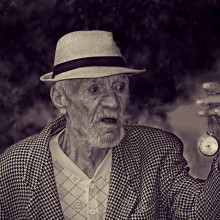
Is dementia on the rise?
Chris answered this question...
Chris - Well actually it's both Anand. We're seeing better pickup because we know what we're looking for but, also, people are living longer. We've got an ageing population and that means more people are living long enough to develop dementia. And the stark reality is at the moment there are about 30 million people in the world with dementia; within the next 30 years or so, that number's set to climb to 150 million. It could become as much as a third of the populations of some western countries. So, certainly, governments are very very worried about how we're going to care for these people with these problems in the future...

How long does it take for a comet to form?
Kat quizzed Stuart with this spacey question...
Stuart - So a comet is this mixture of frozen gases and frozen ice and dust compacted together into an object, and it's different to a meteor so it's different to just the rock that we see. Because comets, particularly, have this phenomena that as they come into our solar system, as they get near to the sun, they get bathed in sunlight, that some of these gases will start to melt and vaporise and that's what give comets it's atmosphere and sometimes it's tail that travels across the universe. And how long do they take to form - you kinda need to ask where do they come from? So it goes all the way back to the start to the start of our solar system. So 4.6 billion years ago, where the solar system basically consisted of a large cloud of dust and particles in a large field and, over time, these dust particles start to aggregate, start to clump together and form combinations of material that got larger and larger. Now some of those went on to be very big and become planets but some of them remained quite small and developed into comets. And it's very difficult to say exactly how long they take to form because it's a very long time ago. So things that are a very long time back we have quite large uncertainty, we have quite large error bars on our calculations, but some of the estimates put it around 10,000 to 100,000 years for a comet to form in the form it's in. And surround our solar system is something called the oort cloud, which is a giant cloud of comets just sitting there waiting there and, occasionally, one of them gets bashed into and starts its journey into our solar system and either does an orbit around the sun, or goes crashing into a planet, or crashing in and out again.
Kat - I guess that's like the 67P - I'm going to try and say it. Come on Chris
Chris - 67P/Churyumov-Gerasimenko.
Kat - Gerasimenko. That was a very impressive comet in our solar system that we actually managed to land something on.
Stuart - Incredibly impressive. And just to show how recent and how our understanding of comets is still developing, in the last few weeks the Rosetta mission has actually announced some new results, saying that their spacecraft Rosella, which is orbiting this comet, has been doing some measurements to understand the composition of the comet. And actually, we thought what's a comet like inside, has it got caverns, has it got holes but actually, they're very uniform. This dust and frozen mix is very uniform throughout the entire comet.
Kat - I do love the idea - they're like the stuff at the back of the freezer of the universe, aren't they really? All this stuff is there and has always been there.
Stuart - And that's why it's so exciting, so it can tell us something about the very origins of our solar system.

Is spicy a taste?
Kat put this zinger to Chris...
Chris - Well actually, someone wrote on the Naked Scientist web forum, which you can go to: nakedscientist.com/forum. They said - rub some chilli in your eye and then you'll understand it's not about taste - it's about pain. And the answer to this question is, actually, an anatomical one and a functional one. We tend to talk about five different tastes or taste sensations: bitter, sweet, salty, and sour. And they are recorded or detected on your tongue by what we call taste buds, which are specialised clusters of nerve endings which are covered in receptors - these are molecules that can lock onto various things in food and they then signal to the nerve and tell the nerve to fire off impulses to your brain stem, which then tells your brain "this is what I am tasting." And that's confined to the tongue and there are two nerves that do that job; there's a nerve at the anterior (the front) two thirds of the tongue called the chorda tympani, which supplies some of those taste sensations; there's another nerve called the glossopharyngeal nerve, which innervates the back third of the tongue.
Now pain, on the other hand, is not just restricted just to the tongue. You can sense those sensations all around your mouth cavity, all over your tongue, and in your throat. And chilli is capsaicin (that's the molecule), and it binds onto a totally different class of nerve fibres called C-fibres. They have on their surfaces a certain molecular docking station or receptor called TRPV1. When the capsaicin binds onto them it triggers a burning - or heat - sensation; those same nerve fibres also tell you whether something is hot or cold. So, in other words, what we call taste is detected in a very special way in a very special place by a very special cluster of nerves. Those pain sensations are detected alongside all the other sensations you can feel in your mouth by the trigeminal nerve, so it's anatomically different and it's functionally different. Therefore we don't regard the chilli pepper taste as a taste, we regard it as a sensation.
Kat - And presumably this is why the saying goes - a really really hot curry or a chilli "will burn on the way out as well as the way in".
Chris - It does. You don't have very many of those pain fibres innervating the rest of your GI tract. But your mouth and your bottom end, those actually are made by the outer layer of your body embryologically, the outer coating of your developing embryo, growing in and uniting with your gut tube and taking with it the kinds of nerves that are there. And your trigeminal nerve is the nerve concerned, and that's the one that's got the receptors for chilli. Which is why, yes, you're very sensitive on the way in, and very sensitive on the way out, if it's a hot one...

What is the dark web?
Kat put this one to Peter Cowley...
Peter - Well let's define that first. So the web that we know usually which is the stuff you can get at by a search engine, Google or Bing or something - it's about 50 billion pages nowadays. Now the next level down is so-called the deep web. This is not accessible by a search engine. This is massively bigger, this is 500 times bigger - that's 25 quadrillion pages out there.
Kat - What sort of stuff is in the deep web then?
Peter - Stuff that the search engine can't get at, so stuff where you've got to have logged in. So you log into say your bank account or whatever.
Kat - Or a corporate intranet or something like that?
Peter - Exactly. But something where you've got throught the internet to get to it. Something where the web page changes depending on certain factors. That is absolutely astronomical and it's probably immeasurable and part of the deep web, i.e. difficult to get at, is called the dark web and that is minute in comparison. This is probably just a few tens or low hundreds of thousands of pages, so absolutely tiny.
Kat - So what's in this dark web and then how do you get to it?
Peter - Well first of all how you get to it. For the research for this programme I didn't dare go onto it because you have to load some rather dodgy looking software onto your PC or your laptop. So you get to it by having some special software on your machine which then, effectively, completely anonymises you and all the traffic which goes over the public internet. It's all completely hidden from anything else.
Chris - The Tor browser isn't it?
Peter - The Tor browser, exactly. So you have used it have you Chris? We'll talk about that later
Kat - So people are using this completely anonymous function to do some, I'm sure, completely non-nefarious things? But also we do hear about nefarious things.
Peter - Yes, so the nefarious thing is the dark web itself. Really dodgy stuff you know, buying and selling.
Kat - It's basically sex and drugs isn't it?
Peter - It's sex and drugs exactly, and weapons. But also the terrorists use it - anything where you want to hide yourself completely away. And so, are we worried about it? Probably not. I mean there are people who are worried about it, the NSA, GCHQ and MI6. There's a whole stack of security forces who are trying to dig around there because they'll be able to generate all kinds of information which will lead to criminals being found, but I think as a normal member of the population we shouldn't worry about it. There's plenty of criminality going on anyway. I don't think you should worry about it.
Kat - Exactly. Stuart.
Stuart - Yes and there's a real irony behind this as well, because the Tor router, the Onion router which you referred to. This software was developed originally by the U.S. government as a means, so it's kind of come a full circle and they're now trying to hack something that was originally developed as a government project. And it really goes to the heart of that debate of privacy and encryption that we're currently having.
Chris - Also, if you want to catch people doing naughty things, you need to allow them to do the naughty thing in a way that you can monitor. So actually having the dark web there, in a way that you can monitor it but without them knowing you're monitoring it. It's kind of good in some respects, isn't it?
Stuart - Well it depends, yes. And this is the challenge. Tor is not foolproof. We don't really understand; we don't know exactly how anonymous things are and, actually, true anonymity on the web is a very hard thing to achieve.
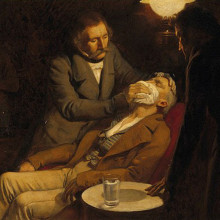
Can people dream under anaesthetic?
Kat asked Chris this question...
Chris - Almost certainly not. The reason is that when you go to sleep and you have what's called physiological, normal sleep, this is a very organised process of brain activity. Dreaming occurs when you go through a phase of which is called REM (rapid eye movement) sleep and you can see when this happening to somebody because, if you look at them when they are sleeping. you will see their eyelids flickering because their eyeballs are moving around underneath their eyelids. If you wake someone up when they're doing that and ask them do you remember anything, do you recall anything, they will almost overwhelming say "I was just having a dream". And as you go through the night your dreams become longer, they become more detailed and you tend to have your best, richest and most memorable and recallable dreams right at the end of a night's sleep. We don't know what dreams do, but they're very important for psychological well being. If you deprive people of restful sleep and dream sleep, then they don't feel rested the next day, they don't remember things, they can't form new memories properly, and that kind of thing. So it's probably got some kind of brain cleansing or memory consolidation role. But when you put people to sleep with an anesthetic agent, anesthetics disrupt the membranes of nerve cells and what they do is make nerve cells become less active than they should be. They increase the activity of inhibitory nerve signals in the brain and they decrease the excitation in the brain and, as a result, they basically just shut down your brain for the most part. There are some that work slightly differently but that's the general process. And so all they do is just turn you into an unconscious individual with very low levels of brain activity, not this organised pattern of dream activity, so you do not dream when you're under an anaesthetic, although, when you're waking up, you may have some bizarre experiences because your brain is just beginning to kick-in and return to consciousness. And so some people do describe some rather strange memories as they wake up from an anaesthetic, but that's not when they were actually anaesthetised.
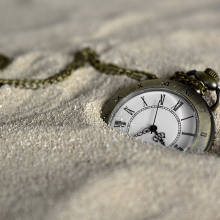
Why is a day divided into 24 hours?
Kat just about found time to ask Stuart this question...
Stuart - So this is really interesting because it's actually an historical question. So historians have attributed this division of the day into 24 hours to the ancient egyptians. And the idea is they had 10 hours for the daytime, 10 hours for the nighttime, plus 2 hours each for the dusk and dawn, and that's what formed the 24 hour clock. And there's an idea that this might have been linked to the number of stars that astronomers were seeing in the night sky at the that time, that maybe there was around 12 stars that occur during different phases of the night. And that's what gives us our 24 hour clock.
Kat - But where does the 60 minutes and 60 seconds come from?
Stuart - So that even more interesting. It's not from the same place and so this idea of 60, this base 60 system. When I say base 60, I mean when we start counting from 0 to 59, that's the number of digits that represent our time. That kind of goes back to the Babylonians and the idea that they were fascinated with this idea of 60 and we're not too sure why but historians think, or people have speculated that it's due to the fact that 60 is a very good number for dividing into different fractions. And that's the way the base 60 minutes and 60 seconds comes from.
Kat - Well would it work if we say had metric time. Would that be possible or just completely confusing for everyone?
Stuart - So it's important to specify what we mean by metric time. Our SI unit of time, the base unit that scientist use to measure time is the second and that's standard.
Kat - You get milliseconds though. So that's going from base to into decimal.
Stuart - Yes, so that is already a metric, a decimalised form of time and that's commonly used throughout the sciences because it's easy to work with; we like counting to ten. And actually it's a real problem because if you think about how computers work, which are reliant on date and time, how to record that on a computer is a really challenging problem. So a lot of systems, in particular ones that are based on an architecture called Unix, use a specific point that's the start of time. They use January 1st, 1970.
Chris - 1970. And that's what lead to the millennium bug, wasn't it?
Stuart - It's one of the reasons. The millennium bug specifically was about what happens when the programmes were being a bit lazy and only recorded the last two digits of the date, like 00 or 01. But actually, there's a proposed problem coming up in 2038 which is where, basically, we ran out of space to store the number of second since 1970, which is how computers count time.
Chris - So what will they do about the Unix time stamp problem then when potentially run out of space? Is there a new solution to surmount that?
Stuart - Yes. So the problem is down to basically how much space you allocate in the computer to count the number of seconds. So what Unix time means is that the computer is just counting from zero seconds (1st January, 1970) up to the current time in seconds and that has it's own problems because, actually, the solar year and the solar times are all complicated. There's leap seconds, we need to adjust for the rotation of the earth moving - it's a very complicated issue. But what you can do, of course, is just redesign your system and if you implement, basically, software updates. That's what you need to do - update your system - very important.
- Previous Game changing cancer cure?
- Next How big is a drop?










Comments
Add a comment